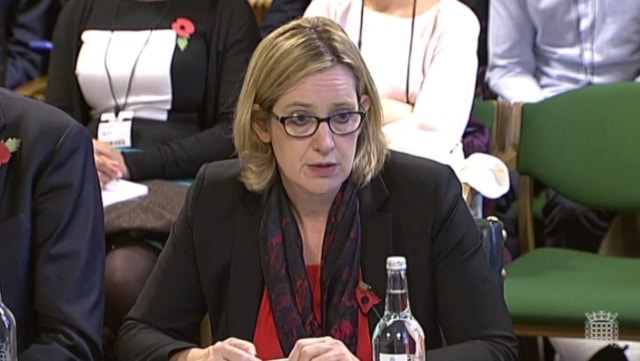Energy and Climate Secretary Amber Rudd has today confirmed that the UK doesn’t have the right policies in place to meet its legally binding 2020 renewable energy target.
“There is insufficient evidence that we are going to make the target for 2020 unless we take certain action,” Rudd told the Energy and Climate Change Committee hearing on the Department of Energy and Climate Change’s (DECC) accounts.
“It is difficult to say whether we’ll meet the 2020 renewable energy target,” Rudd said, but added, “I am committed to making the policy changes to meet the 2020 targets.”
Energy and Climate Change Committee chair Angus MacNeil criticised Rudd for her misleading public statements on renewable energy: “Whether or not it was your intention to mislead there has indeed been some misleading use of language and confusion about whether on different occasions you’re talking about renewable energy targets [or] renewable electricity targets. So, can we begin by trying to get some clarity to the debate?”
Leaked Letter
These statements come on the heels of The Ecologist’s shocking article published yesterday revealing a leaked private letter sent by the energy secretary to colleagues about the UK’s renewable targets.
The news also follows analysis by the BBC published today, showing that government energy policy changes since the election are likely to increase carbon emissions.
In the leaked letter, dated 29 October, Rudd admits that the UK is set to miss its 2020 target of generating 15 per cent of all its energy from renewable sources – an obligation which is legally binding at the EU level.
This target is not just for electricity generation but also includes energy for heat and transport – a point touched on by MacNeil during today’s hearing when he asked Rudd to clarify where the government stands on all three, not just electricity.
Rudd asserted that the UK is set to meet its target of 30 per cent renewable electricity but admitted she is “concerned about the work that is being done on transport and heat”.
“It is going to be challenging to make the rest of the target,” she said. “We don’t have the right policies” to hit the 2020 target Rudd said, emphasising gaps in transport and heat policy in particular.
“That is why I have been writing to other ministers in other departments, particularly in transport, to urge them to work across government to make sure we do make these targets,” she explained.
“But I remain committed to making good progress towards that target, and it is because I am so committed to that, that I am encouraging other secretaries of state to take action.
“This is after all a cross-government target, it is not just for my department. I am going to be working with transport and internally I am going to be putting together policies on heat to try and [address] the shortfall…”
Renewable Shortfall
This “shortfall” in renewable energy was emphasised by Rudd in her candid letter sent to Foreign Secretary Philip Hammond, Oliver Letwin of the Cabinet Office, Greg Hands, Chief Secretary to the Treasury, and Transport Secretary Patrick McLoughlin.
In the letter, Rudd writes that after 2017-18 “the trajectory then increases substantially, and currently leads to a shortfall against the target in 2020 of 50 TWh (with a range of 32-67TWh) or 3.5% points (with a range of 2.1-4.5% points) in our internal central forecasts (which are not public).”
This means that internal department forecasts show the UK will only manage to get about 11.5 per cent of energy from renewables by 2020.
Rudd went on to add however, that “Publically we are clear that the UK continues to make progress to meet the target.”
No Credible Plan
These revelations are particularly controversial given the government has been cutting subsidies for solar and wind energy while maintaining that it is on course to meet its international targets.
In a statement to Parliament on 22 June she said: “We are on course to achieve this objective. Renewables already make up almost 20 per cent of our electricity generation and there is a strong pipeline to deliver the rest.”
But again, Rudd’s private letter further contradicts this final statement. In it, she warns of “the absence of a credible plan to meet the target”.
In addition, she warns that failing to meet the 2020 target risks successful legal action and on-going fines imposed by the EU Court of Justice until the UK reaches the target.
To address the predicted shortfall in renewable energy Rudd goes on to outline various options in the letter – none of which include wind or solar energy. One last resort option, for example, would be to pay for renewable projects in other European countries as a way of offsetting the UK’s failure to increase its own generation as well as trying to engage EU member states to make the target more “flexible”.
Subscribe to our newsletter
Stay up to date with DeSmog news and alerts







